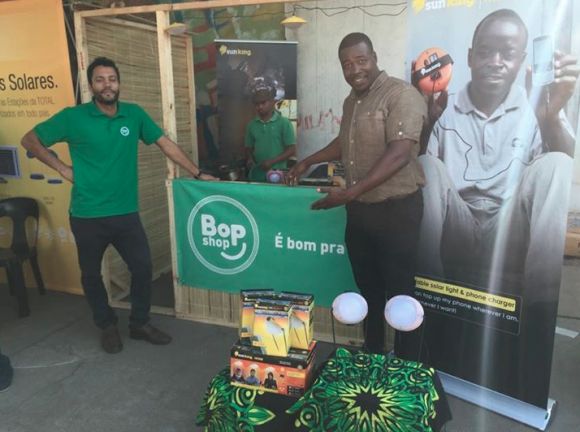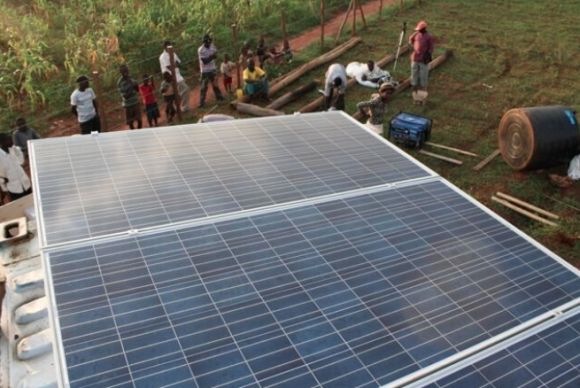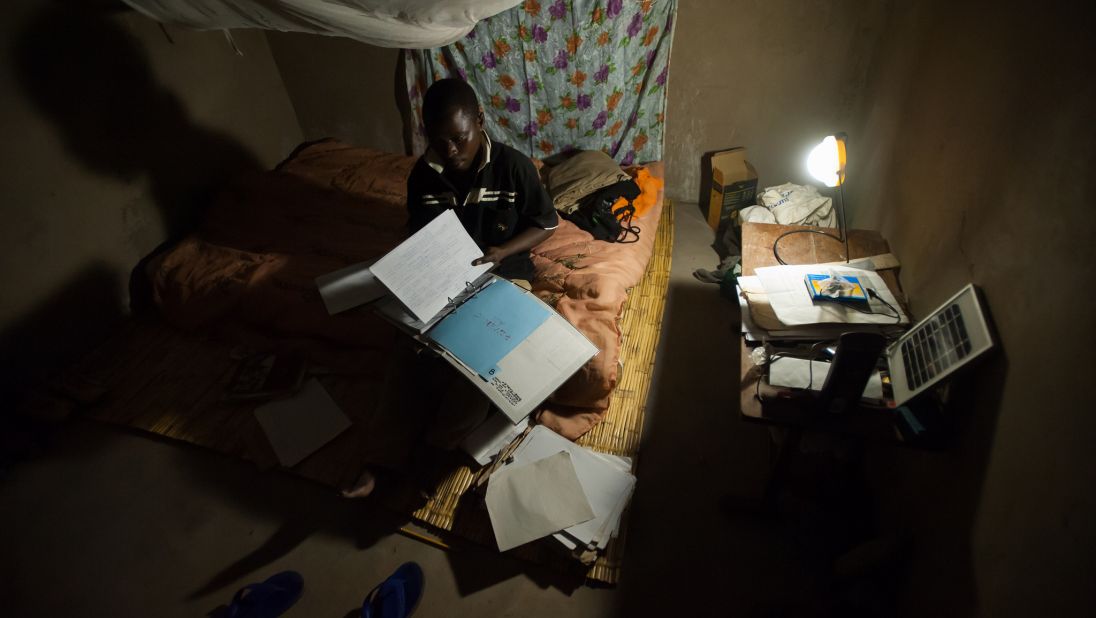Emmett Costel is surprisingly upbeat for a man who has just returned from a trip where his car broke down in Cabo Delgado, a province in the far north of Mozambique.
He shrugs it off. “It happens.”
Costel is looking cheerful because the long journey, even the breakdown -- “a blown gasket, a four-hour tow, followed by much wrangling to rent a truck and then some” -- is worth the effort.
“I wouldn’t be doing it if I didn’t see the potential,” he says, describing how, in the village of Quionga, he delivered 150 solar home systems that will be sold to people and small businesses who have relied on a mix of kerosene, batteries, and biomass to power their lives.
Costel's business is called the BoP Shop. BoP stands for "bottom of pyramid," which describes the people and small businesses who are struggling to meet their own energy needs. The BoP Shop acts as a distributor for products that target off-grid consumers. He set up the company with Boris Atanassov, a local renewable energy consultant.
Demand for Costel's solar services are growing rapidly. The demand is driven not by financial support from international donors or the government. Rather, it's because the BoP Shop is delivering something people want at a price they can afford.

Emmett Costel shows off the BoP Shop stand. Photo credit: BoP Shop.
Raised in Mozambique and university-educated in the U.S., Costel returned to his native country to join a group of professionals and entrepreneurs in an effort to find clean solutions to meeting Mozambique's growing energy needs.
Mozambique typifies other sub-Saharan African nations in its accelerating economic growth -- 7 percent over the last 10 years. And, like the other sub-Saharan nations, it desperately needs more power to sustain that level of growth.
The government says that building a resilient grid is a priority. But three-quarters of the population isn't connected to the grid to begin with. Of those, 14 percent are self-supplied, leaving nearly 60 percent with no access to electricity beyond single-use batteries.
Extending the grid to this large off-grid population is a huge undertaking that will take years and require significant investment. The national utility Electricidade de Moçambique (EDM) already has its hands full building major transmission lines and supplying the country’s core industries.
“What they really want to know is what people everywhere want to know: Will it improve my quality of life?” Boris Atanassov
Costel's business partner, Boris Atanassov, holds up a 6-watt SunKing solar home system. Light fills the room, followed by chatter from Rádio Moçambique. After lighting up the room with a system’s LED lamp and switching on the radio, Atanassov plugs in a phone to charge. “This will run on battery for 8 hours,” he announces, “more than enough for the waking nighttime hours.”
The first time Atanassov brought the small systems to the village of Quirindi, he sold 50 of them for $100 each -- a major achievement considering that the typical income for rural adults in Mozambique is under $100 per year.
“You have to understand how valuable energy -- particularly electricity -- is to these off-grid communities. Households will spend up to $10 a month on traditional sources of energy for illumination such as candles, kerosene, and single-use batteries for torches, as well as paying for cellphone charging points. Our job is to explain how the solar home systems offer real value for money," explains Atanassov.
In the past, entrepreneurs talked about the long-term health benefits of using solar and about carbon-emission savings. But that's changing.
"What they really want to know is what people everywhere want to know: Will it improve my quality of life? Will it provide entertainment? Will it improve my economic well-being? We have to show them how a home solar system will do all of that," says Atanassov.
Equally important is building trust. Just as electronics companies in developed nations offer warranties, all BoP Shop solar systems come with a guarantee. In the past, donor-led programs where oversized panels were installed for free have fallen out of use simply because of blown fuses or other small technical problems.
The pitch seems to be working. Despite being their most expensive system, BoP Shop’s bestseller is the SunKing's 6-watt home system. People are buying the products, and more entrepreneurs are setting up shop to sell them around the country.
Mobile money and off-grid services
Cost improvements in solar and LEDs are making off-grid systems more accessible. But the mobile phone is perhaps the most important enabler. Through mobile payment options, cellphones have helped off-grid solar companies like M-KOPA Solar and Off-Grid Electric reach hundreds of thousands of customers in Kenya, Uganda and Tanzania.
Traditional sources of off-grid energy like kerosene, charcoal, and single-use batteries have historically enjoyed one major advantage over solar: they are 99 percent operating costs, whereas solar is 99 percent capital cost.
While solar systems are cheaper over their lifetime than kerosene, a customer making $10 to $50 per month often couldn't afford a $100 system. But spending $5 to $15 per month on kerosene or single-use batteries was an option. Mobile pay-as-you-go options are changing that equation.
Vivian Vendeirinho, the founder and CEO of RVE.SOL, is looking to remove incumbents’ traditional advantage by setting up a payment collection using an increasingly common approach -- a cellphone-based payment system.
RVE.SOL plans to provide off-grid households in Mozambique with not only light and power, but also with water and cooking gas -- all paid for via cellphone. RVE.SOL has compressed those core utility services into a container that houses solar panels, a battery, water purification equipment, and a biogas converter. The company installs the containers in off-grid villages where they act as a hub, providing power to between 75 and 150 households through a mini-grid.

Solar panels installed by RVE.SOL in Mozambique. Photo credit: RVE.SOL.
The model would be much more difficult to finance without giving customers options to pay via cellphones.
“Mobile money is changing the way people can pay,” Vendeirinho explains.
RVE.SOL links a meter to a mobile money account, allowing users to prepay for usage. "These regular payments via their cellphone flip solar into a 99%-operating-cost product, making it affordable to a much broader swath of the off-grid population who don’t have savings or access to capital," says Vendeirinho.
The off-grid opportunity in sub-Saharan Africa
The potential market across sub-Saharan African is significant. Two-thirds of the region’s population -- 620 million people -- lack access to energy. Until recently, efforts to tackle this energy gap focused on scaling up large power plants and the centralized grid. However, these efforts have largely benefited corporations and industrial customers, not individuals disconnected from the grid entirely.
The consulting firm McKinsey forecasts that 500 million people in sub-Saharan Africa will still lack a grid connection in 2040.
The challenge lies not just in building new generating capacity, but in the transmission and distribution of electricity. The cost and difficultly of stringing power lines out to remote and low-income communities means grid extensions are often both too slow and uneconomic.
Almost 2 billion people worldwide have been connected to traditional centralized electricity grids over the last 20 years; however, access to the grid in sub-Saharan Africa barely grew at all between 2000 and 2010.
“Mobile money is changing the way people can pay.” Vivian Vendeirinho
Energy entrepreneurs have grounds to be optimistic. As solar and battery costs continue to fall, and mobile money changes the way people can pay, the last couple of years have seen off-grid energy companies start to hit commercial scale and attract significant international investment.
M-KOPA Solar, for example, (M=mobile, KOPA = to borrow), an early pioneer in the sector, now has more than 200,000 households using its systems across Kenya, Tanzania and Uganda. The company raised $20 million in debt and equity in 2014, followed by a further $12.5 million in February this year.
Meanwhile, Tanzania-based Off-Grid Electric also closed two funding rounds last year, raising $23 million from investors led by Zouk Capital and SolarCity. SolarCity's CEO Lyndon Rive also sits on Off-Grid Electric’s board.
Beyond energy access
Vendeirinho's ambition is to reach a similar kind of scale. The really exciting thing, he explains, is the impact on credit. Once RVE.SOL’s customers are established as reliable customers, they can operate on a credit basis, which means they can buy other things they couldn’t afford before -- not just energy.
“The first question I get when I go out to these communities to explain the technology is, ‘Will it power a fridge?’ Very few of the people I talk to can afford the upfront payment for a fridge, and virtually none of them have any kind of credit history that would persuade someone to lease them a fridge," says Vendeirinho.
However, with these regular payments, RVE.SOL will generate a credit history. The company can determine who is able to afford 25 watts of power, 50 watts of power, 100 watts of power, and -- further down the line -- a refrigerator, a TV, or even a loan for their business.
In this respect, these entrepreneurs are doing more than just delivering energy. They're delivering a service that can quickly transform lives.
***
Gabriel Davies is an analyst with Augusta & Co. Merchant Bankers, based in London. He was previously a policy advisor at the U.K. Department of Energy and Climate Change.



